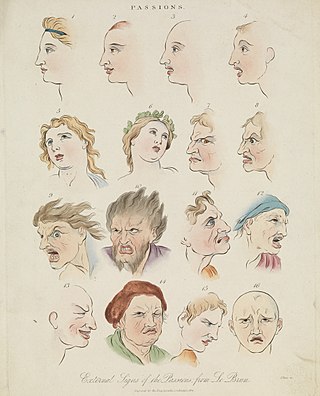Related Research Articles

Emotions are mental states brought on by neurophysiological changes, variously associated with thoughts, feelings, behavioral responses, and a degree of pleasure or displeasure. There is currently no scientific consensus on a definition. Emotions are often intertwined with mood, temperament, personality, disposition, or creativity.

Shame is an unpleasant self-conscious emotion often associated with negative self-evaluation; motivation to quit; and feelings of pain, exposure, distrust, powerlessness, and worthlessness.

Erving Goffman was a Canadian-born American sociologist, social psychologist, and writer, considered by some "the most influential American sociologist of the twentieth century".

Restorative justice is an approach to justice that aims to get offenders to take responsibility for their actions, to understand the harm they have caused, to give them an opportunity to redeem themselves, and to discourage them from causing further harm. For victims, its goal is to give them an active role in the process and to reduce feelings of anxiety and powerlessness.

Psychology is an academic and applied discipline involving the scientific study of human mental functions and behavior. Occasionally, in addition or opposition to employing the scientific method, it also relies on symbolic interpretation and critical analysis, although these traditions have tended to be less pronounced than in other social sciences, such as sociology. Psychologists study phenomena such as perception, cognition, emotion, personality, behavior, and interpersonal relationships. Some, especially depth psychologists, also study the unconscious mind.

Labeling theory posits that self-identity and the behavior of individuals may be determined or influenced by the terms used to describe or classify them. It is associated with the concepts of self-fulfilling prophecy and stereotyping. Labeling theory holds that deviance is not inherent in an act, but instead focuses on the tendency of majorities to negatively label minorities or those seen as deviant from standard cultural norms. The theory was prominent during the 1960s and 1970s, and some modified versions of the theory have developed and are still currently popular. Stigma is defined as a powerfully negative label that changes a person's self-concept and social identity.

Microsociology is one of the main levels of analysis of sociology, concerning the nature of everyday human social interactions and agency on a small scale: face to face. Microsociology is based on subjective interpretative analysis rather than statistical or empirical observation, and shares close association with the philosophy of phenomenology. Methods include symbolic interactionism and ethnomethodology; ethnomethodology in particular has led to many academic sub-divisions and studies such as micro-linguistical research and other related aspects of human social behaviour. Macrosociology, by contrast, concerns the social structure and broader systems.
Like rational choice theory, conflict theory, or functionalism, pure sociology is a sociological paradigm — a strategy for explaining human behavior. Developed by Donald Black as an alternative to individualistic and social-psychological theories, pure sociology was initially used to explain variation in legal behavior. Since then, Black and other pure sociologists have used the strategy to explain terrorism, genocide, lynching, and other forms of conflict management as well as science, art, and religion.
In philosophy, psychology, sociology, and anthropology, intersubjectivity is the relation or intersection between people's cognitive perspectives.
Social stigma is the disapproval of, or discrimination against, an individual or group based on perceived characteristics that serve to distinguish them from other members of a society. Social stigmas are commonly related to culture, gender, race, socioeconomic class, age, sexual orientation, body image, physical disability, intelligence or lack thereof, and health. Some stigma may be obvious, while others are known as concealable stigmas that must be revealed through disclosure. Stigma can also be against oneself, stemming from negatively viewed personal attributes in a way that can result in a "spoiled identity".
Emotion work is understood as the art of trying to change in degree or quality an emotion or feeling.
Randall Collins is an American sociologist who has been influential in both his teaching and writing. He has taught in many notable universities around the world and his academic works have been translated into various languages. Collins is currently the Dorothy Swaine Thomas Professor of Sociology, Emeritus at the University of Pennsylvania. He is a leading contemporary social theorist whose areas of expertise include the macro-historical sociology of political and economic change; micro-sociology, including face-to-face interaction; and the sociology of intellectuals and social conflict. Collins's publications include The Sociology of Philosophies: A Global Theory of Intellectual Change (1998), which analyzes the network of philosophers and mathematicians for over two thousand years in both Asian and Western societies. His current research involves macro patterns of violence including contemporary war, as well as solutions to police violence. He is considered to be one of the leading non-Marxist conflict theorists in the United States, and served as the president of the American Sociological Association from 2010 to 2011.

Asylums: Essays on the Condition of the Social Situation of Mental Patients and Other Inmates is a 1961 collection of four essays by the sociologist Erving Goffman.
Hypermasculinity is a psychological and sociological term for the exaggeration of male stereotypical behavior, such as an emphasis on physical strength, aggression, and human male sexuality. Within psychology, this term has been used ever since the publication of research by Donald L. Mosher and Mark Sirkin in 1984. Mosher and Sirkin operationally define hypermasculinity or the "macho personality" as consisting of three variables:
Feeling rules are socially shared norms that influence how people want to try to feel emotions in given social relations. This concept was introduced by sociologist Arlie Russell Hochschild in 1979. Hochschild's 1983 book, The Managed Heart: Commercialization of Human Feeling, discusses feeling rules in greater depth, especially in the occupational worlds of flight attendants and bill collectors. Hochschild draws on the work of sociologist Erving Goffman as well as labor scholar Harry Braverman to discuss the dramaturgical demands and emotional labor entailed by jobs in the service sector, in which workers must "perform" certain roles that entail abiding by certain feeling rules. She notes that women are more likely to have such jobs than men, and that analysis of feeling rules may therefore be especially relevant to understanding the gendered dimensions of labor. This work foreshadows themes from her later analyses of women's work, both paid and unpaid, e.g. in The Commercialization of Intimate Life (2003).

In sociology, social psychology studies the relationship between the individual and society. Although studying many of the same substantive topics as its counterpart in the field of psychology, sociological social psychology places relatively more emphasis on the influence of social structure and culture on individual outcomes, such as personality, behavior, and one's position in social hierarchies. Researchers broadly focus on higher levels of analysis, directing attention mainly to groups and the arrangement of relationships among people. This subfield of sociology is broadly recognized as having three major perspectives: Symbolic interactionism, social structure and personality, and structural social psychology.

The sociology of emotion applies sociological theorems and techniques to the study of human emotions. As sociology emerged primarily as a reaction to the negative effects of modernity, many normative theories deal in some sense with emotion without forming a part of any specific subdiscipline: Karl Marx described capitalism as detrimental to personal 'species-being', Georg Simmel wrote of the deindividualizing tendencies of 'the metropolis', and Max Weber's work dealt with the rationalizing effect of modernity in general.
Psychoanalytic criminology is a method of studying crime and criminal behaviour that draws from Freudian psychoanalysis. This school of thought examines personality and the psyche for motive in crime. Other areas of interest are the fear of crime and the act of punishment.
David Allen Karp is a Professor of Sociology at Boston College where he has taught since 1971. He received his B.A. degree from Harvard University in 1966 and his Ph.D. in Sociology from New York University in 1971. He has written or co-authored nine books and more than fifty journal articles and book chapters. His work appears in such periodicals as Symbolic Interaction, Journal of Contemporary Ethnography, Journal of Qualitative Health Research, the Gerontologist, and the International Journal of Aging and Human Development. His work has largely clustered in three areas: urban life and culture, aging, and the study of mental health and illness.

Affect-logics or Affect logic is a biopsychosocial notion, introduced in 1988 by Swiss psychiatrist Luc Ciompi, relating to Soteria psychiatric treatment, which sheds light on the interaction between thinking and feeling. It holds that affect and cognition, or feeling and thinking, are continually interacting with each other in the cortical network. Ciompi developed this theoretical account for the purpose of understanding the psychological disorder known as schizophrenia.
References
- ↑ "Thomas Scheff". www.soc.ucsb.edu. Retrieved 2016-04-10.
- ↑ California State Legislature, Rep. Jerome Waldie, 1967. “The Dilemma of Mental Commitments in California”. See also Bardach, Eugene. 1972. The Skill Factor in Politics: Reforming the California Mental Health Law. U. of California Press. For a summary, see pp. 201-202 in the 1999 edition of Being Mentally Ill. Scheff was commissioned by the Wisconsin Legislature to do a study of mental hospitals, but his findings were rejected. However, Waldie’s committee, counseled by Arthur Bolton, replicated Scheff’s study in California, forming the groundwork for the new law.
- ↑ "Pacificsoc.org: Past Officers & Editors". Archived from the original on 2008-05-19. Retrieved 2009-07-20.
- ↑ Goffman Unbound!: A New Paradigm for Social Science (1st ed.). Routledge. 2006-09-17. ISBN 9781594511967.
- ↑ Toward a Sociological Imagination: Bridging Specialized Fields. UPA. 2002-07-09. ISBN 9780761823421.
- ↑ Scheff, Thomas J. (1975-01-01). Labeling madness . Prentice-Hall. ISBN 9780135173596.
- ↑ Scheff, Thomas J. (1967-01-01). Mental illness and social processes . Harper & Row.
- ↑ Scheff, Thomas J. (1970-01-01). Being Mentally Ill: A Sociological Theory. Transaction Publishers. ISBN 9780202364308.